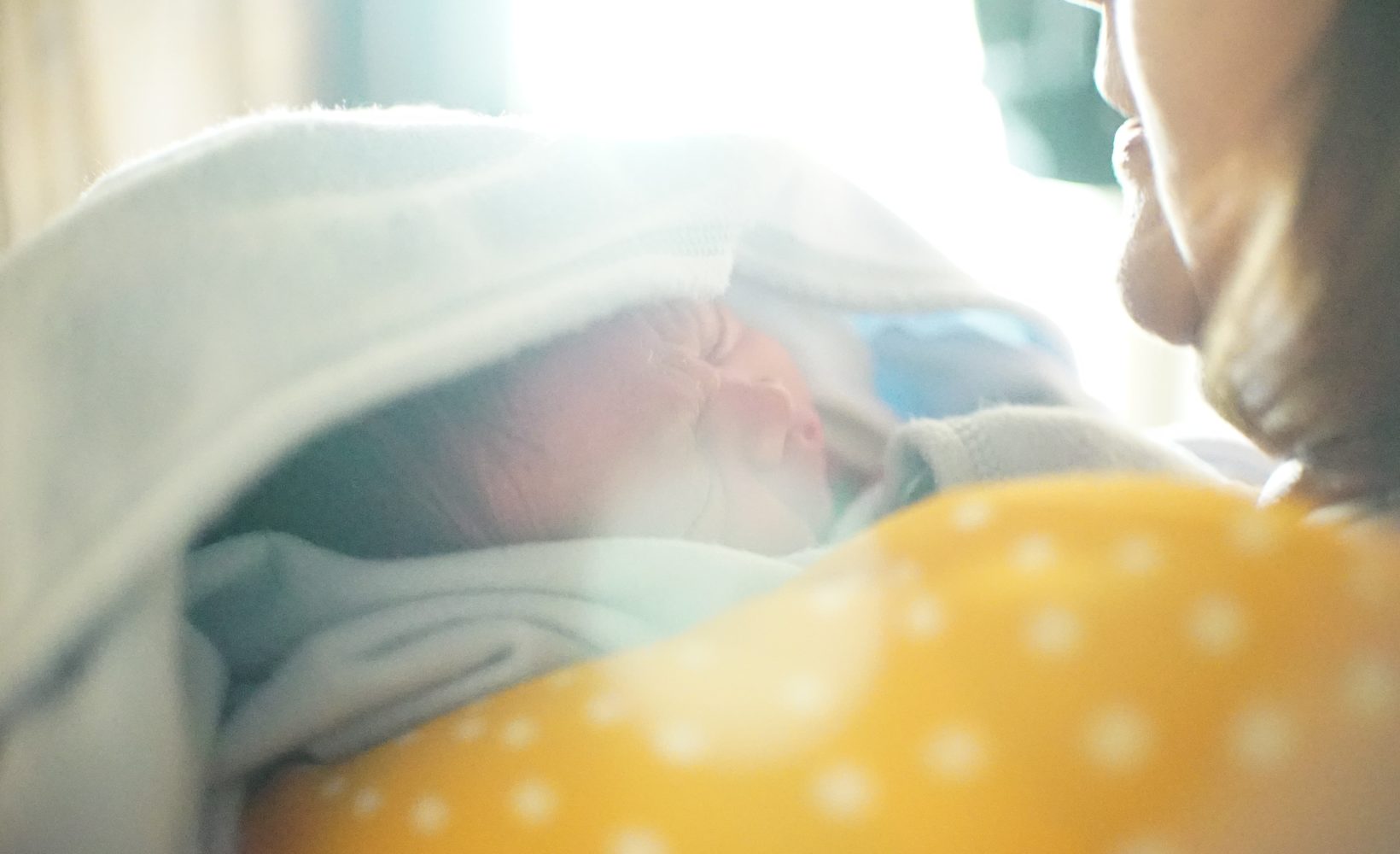This essay originally appeared in our monthly newsletter for The Mom Hour podcast. To get our emails, subscribe here. –Sarah
When I was a brand-new mom, I attended a support group at the hospital where I’d given birth. The facilitator was a woman named Andrea, a labor and delivery nurse and lactation consultant at the hospital, herself a mom of four and brand-new grandmother to a preemie at the time. After about a year, my baby and I proudly aged out of the group and went along our merry way, and Andrea and I lost touch. But a few years later I had an article published in a local parenting magazine in which I wrote about those early support group experiences, and I sent a copy to Andrea at the hospital. We reconnected, became Facebook friends, and when I gave birth for the third time at that same hospital in early 2013, Andrea popped her head into my room for a visit during one of her shifts.
She wasn’t my assigned postpartum nurse, and I was no longer a first-time mom full of questions, so we chatted more like friends than provider/patient. In fact, I was feeling pretty proud of myself for navigating those really rough first 24-hours post-C-section with less nausea, confusion, and pain than the first couple of times. Violet and I were set to be discharged later that morning, and I showed her off to Andrea while getting situated for a feeding through the now-familiar folds of my hospital gown. As tiny Violet rooted and latched awkwardly and I chatted away, I noticed Andrea pause as if she wasn’t sure whether it was her place to say something. When she finally spoke, she gave some me gentle reminders about how best to position the baby and get a good latch, specifically making sure that Violet’s lips weren’t tucked under and instead formed a big “fish mouth” shape.
And even though the lesson was was delivered in the MOST earth-mothery, gentle, and supportive manner, by a woman I trusted and admired, I couldn’t help but feel a little schooled. In my mind, I knewhow to do this already. I had successfully breastfed two other babies through the tricky early weeks and successfully gone on to nice long nursing relationships with both of them. I had precisely ZERO doubts that I would be able to do the same with Violet, and hadn’t been expecting a remedial lesson at that moment. But Andrea was right to say something, and I’m glad she did. It was a small tweak to my casual, overconfident positioning—even moms of many can forget just how TINY and floppy a one-day-old nursling is!—and an important reminder that probably saved me a ton of of nipple pain. I recovered from my exposed hubris, and Andrea and I both marveled at Violet’s determined efforts, now aided by a classic football hold and tiny, adorable fishy lips.
My whole life I’ve been very proficient – and efficient – at learning something the first time. I was an eager student who loved to learn, quick to make connections and synthesize information. This made school a relative breeze; I liked it, and “it” (teachers, report cards, exams, and the system in general) favored me. And as long as I was progressing through new material (which is essentially the structure of academic learning, save for review units here and there) I was always learning new stuff, nailing it, and moving on to the next thing. It wasn’t often in an academic setting – or ever, if I’m honest – that I had to be re-taught something I’d already learned.
But regular life doesn’t operate like school, and it turns out that relearning is a pretty essential part of being a grownup. Our neural pathways are complex, we know, and they’re malleable. We can learn something new – like how to breastfeed a baby or make Cream of Wheat without looking at the instructions on the box – and then on top of that we can layer our own experiences, adaptations, and subtle tweaks to make the process our own (I like more salt in my Cream of Wheat than called for, and I stir in a little butter at the end). Our mastery of the thing forges its own set of neural pathways, strengthened through repetition, and unless we’re handed a pop quiz, we may not even realize how many liberties we’re taking or how far we’ve strayed from the original lesson.
Until we do realize it, as I did with Andrea in the hospital that day. We realize it’s been a while, we’re out of practice, or our memory isn’t as sharp as it once was. We realize something tastes off and maybe we don’t have that recipe quite memorized. We recognize, sometimes sheepishly, that we’ve become so habitual about doing this thing a certain way that we may have overlooked a simpler solution (this happens with technology ALL the time, right?).
And if you’re like me, the discovery that “I need to revisit this and learn it again” can feel frustrating, or even a little bit like failure. I like learning stuff; I don’t like relearning it. I like feeling competent, not questioning what I thought I knew. I’m Hermione Granger with her hand in the air when it’s time to learn a new skill set, but if I’m convinced I’ve already put in the time and effort to master that skill, I’m Ron Weasley groaning in the back row when it’s time to review.
I’ve been thinking a lot about relearning as we approach one year of pandemic life. Last spring we were blasted with a firehose of new life lessons we never asked for: how to work from home, teach our children, sew masks, cancel plans, host a Zoom, and bake bread. We learned so many new things it’s easy to forget how much of pre-pandemic life we left behind in the new learning. And I know things are different in every part of the country, but the sense I’m getting as vaccination rates increase and community spread slows here in California, is that Year 2 of this pandemic is going to involve a lot of relearning skills we’ve barely touched in the last twelve months.
And in that relearning, I imagine we’ll be rusty. And vulnerable. And a little defensive sometimes. Do you remember how to make conversation with a stranger at a kids’ birthday party? Buy movie tickets? Plan a vacation? Do you remember how to navigate a professional conference, a mommy-and-me class, or airport security? I’m not suggesting all these things will come back at once (or that some of them should come back at all), but when you think about the spring and summer months to come, I bet you can think of a few situations that make you feel like I did that day in the hospital with Andrea: like, Wait, I thought I knew how to do this? Where did my confidence go?

So rather than see relearning as an uncomfortable setback, like being sent back to Life 101 despite our vast experience and advancing years, I wonder if we can accept it as part of growth. I wonder if the next time you stumble toward that very faint light at the end of the pandemic tunnel, blinded by the old-new-ness of it all and forgetting the simplest things about how to be a grownup/coworker/parent/friend, you can frame the relearning as an opportunity to be gentle with yourself after a very, very long year.
For me, every time I feel the knee-jerky critical self-talk start in when I’m trying to do something I THINK I should have down by now, I’m going to picture sweet, petite Andrea with her curly graying hair and pixie face, perched on my hospital bed helping my baby get the best start at breastfeeding while helping me save face as an experienced mom of three. There was nothing in her delivery that said “Jeez, Sarah, you’d think you would know this by now” and everything that offered “I know you’re really good at this. Let me help you remember what you already know.”
I would love to hear what you’re relearning right now. Is it something parenting-related, like how to cut grapes into quarters when you haven’t had an infant to feed in a few years? Or something from the world of adulting, like how to pay your property taxes or look up a library book? Whatever it is, you’re doing great. I promise.
Photo by Jorge Dominguez on Unsplash



Leave a Reply